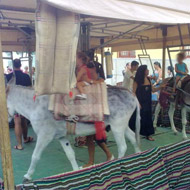"Barbaric" donkey carousels banned in Spanish town

Donkeys working on the "carousels" are kept in cramped conditions with no shade from the sun or peace from the loud music.
A town in Spain has banned donkey "carousels" after The Donkey Sanctuary lobbied the authorities against them.
Donkey carousels are a feature of many Spanish towns during festivals and fairs. Donkeys and ponies are tied by their heads to a fixed turntable and forced to walk around in circles carrying children on "rides".
Thanks to a lobby by The Donkey Sanctuary's Spanish branch, El Refugio del Burrito, these live animal fairground-style rides have been banned in Algeciras, Gibraltar in Southern Spain.
Felipe Macaira, welfare officer, said: “It’s great news that the carousels will be banned. We wrote letters to the authorities asking for them to be banned after we got a lot of complaints about the donkeys and went to investigate and saw how awful and barbaric their conditions were.
“The donkeys and ponies were tied up tightly to the carousel, with their heads in metal cages. They had no freedom to move or to rest and no shade from the sun or peace from the loud music and bright lights. They work up to 12 hours without rest. They’re cramped in and subject to constant loud music and bright lights. Sometimes they can even go blind.
“We’re glad that the Algeciras authorities have agreed to ban the carousels but we hope that other towns will follow suit and ban them as well because they are completely inappropriate as a form of entertainment. We also hope that tourists will avoid using these rides and report any signs of abuse to us so that we can try and help.”
The Spanish branch is continuing to lobby against live animal carousels elsewhere in Southern Spain.



 The veterinary mental health charity Vetlife is inviting the veterinary community to join it for a sponsored cold-water dip.
The veterinary mental health charity Vetlife is inviting the veterinary community to join it for a sponsored cold-water dip.